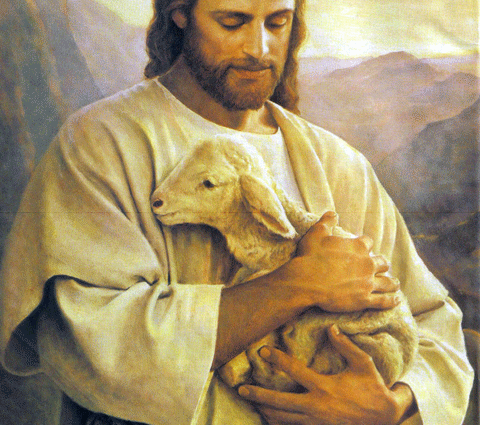Love. I love pizza. I love doing the Wordle. I love the Big Bang Theory. I love my wife. We use that word a lot in our lives, don’t we? In English, we only have one word for love. We refer to the love between spouses with the same word as our fondness for sweet desserts. That kind of love is different, though. We love children differently than spouses. Family is different than acquaintances. That’s only natural and proper. I’m talking about love because there are two different words for love in the Gospel today that illustrate a significant point.
Peter and some other disciples have gone fishing. They have gone back to their comfort zone. After everything that happened, they went back to where they started and the life they knew. They had many questions to think about. So they go to something rote and mindless. Then they encounter Jesus. He feeds them, breaks bread, and they realize who He is.
Then Jesus turns to Peter, the same Peter who had denied Him three times, and repeatedly says, “do you love me?” Jesus asks him using a word for love that means unconditional, sacrificial love. We see this kind of love when we look up at this crucifix over the altar. We hope that husbands have the kind of love for wives and parents for children. “I’d take a bullet” for you kind of love.
Jesus asks Peter, “Are you willing to give up yourself and die for me?” Agape. Pure love. Love with a total commitment and abandonment of our wants and needs. Peter responds with a different word. Peter responds with a word that means brotherly love. Friendship. Phileo. Leonard has this kind of love for Sheldon in the Big Bang Theory. Joey for Chandler from Friends. Bert and Ernie. It’s the kind of love we have for our close, intimate friends. Jesus says, “Peter, do you love me enough to die for me?” Peter responds, “Lord, you know you’re my buddy!” So Jesus asks him again, “Peter, do you love me above all things, even your own life?” Peter again replies, “You know I love you like a brother. Then a third time, being asked once for each time He denied Christ, Jesus asks, “do you love me.”
But this time, He doesn’t say Agape. Jesus says, “Peter… do you love me like a brother?” Peter becomes visibly distressed because he knows He should love Jesus with agape love. He should love the Lord above all things enough to die to his wants and desires and live only for Christ. Can you imagine the pain in Peter’s voice as he replies, “Yes, Lord, you know all things… I love you like a brother.” Then there is this message “when you were younger, you used to dress yourself and go where you wanted; but when you grow old, you will stretch out your hands, and someone else will dress you and lead you where you do not want to go.” Jesus is letting Peter know that He knows where Peter’s heart is right now. He knows that Peter has room to grow in his capacity to love and into his role as the first Pope. Jesus accepts Him where He is but refuses to leave Him there.
Peter eventually loves Jesus and the Church so much that he, too, will die crucified for his faith and the flock entrusted to Him. That’s a message for us today as well. As Catholics, we worship in the presence of the Eucharist, at the altar of God. Our love is supposed to be pure, sacrificial love, in which we offer ourselves to Him regardless of the cost. Most of the time, we fail at that. We instead treat it as a buddy relationship, saying, “God loves me just how I am. He’s my bro.” Yes, he does love us despite our failures and inadequacies, but He also loves us too much to leave us there! He wants to help us grow, to teach us how to love with true, sacrificial love. He assists us to grow into the kind of love we should have. That love comes from communion with Him in the Sacraments, discipline, self-denial, and from serving one another.
As we continue to celebrate Easter, to celebrate that unconditional love that Jesus has for us; we should be seeking to love Him in the same way. To love Jesus the way He loves us. Saint Thomas Aquinas wrote that “The Eucharist is the Sacrament of Love; It signifies Love, It produces love.” As we join together in worship through the Liturgy of the Eucharist, when the minister holds up the Body and Blood, Soul and Divinity of Jesus Christ, we must realize that we are gazing on love itself… and if we allow it, Jesus will take us by the hand and lead us toward that perfect love, that self-giving, sacrificial love of Christ. If we truly receive Him, in a state of grace, with our hearts open to His prompting, we can begin to love others not with our frail and human version of love that compares pizza and puppies with children and family, but rather with the very heart of Christ. That, my brothers and sisters, is life-changing indeed.
A homily for the Third Sunday in Easter: May 1st, 2022

